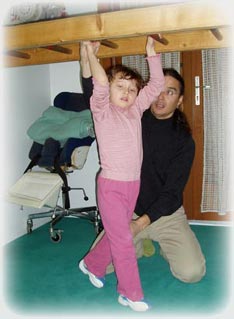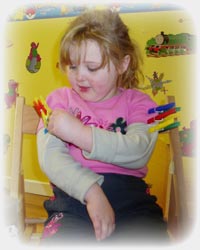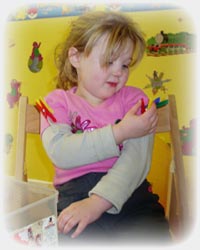 |
INTRODUCTION |
|
| |
 |
OUR WORKING METHOD |
|
| |
 |
CONTACTS |
|
|
 |
OTHERS |
|
| |
|
|
|
|
Our philosophy |
 |
|
1) We look at the whole child:
We believe that
it is necessary to address all the needs
of the child and not to just focus on
his or her main disability. Children on
the Autistic Spectrum, children with Cerebral
Palsy and children with Downs or other
syndromes often improve dramatically with
a change in diet.
Children with Cerebral Palsy may have
intellectual as well as physical problems.
Children with various syndromes may have
physical or co-ordination problems in
addition to difficulties in understanding
and speech.
Even children who are attending school
but have minor learning difficulties often
have underlying physical co-ordination
and /or health problems.
All these need
to be addressed if the child is to develop
to his or her fullest potential.
2) Children
progress best when they are successful:
It is all too
easy to be worried about what a child
cannot yet do.
However, we have found that if we can
encourage a child to improve on what he/she
can already do, it helps to give the child
the confidence to attempt more challenging
tasks.
3) Parents
can make excellent therapists for their
own child:
In all the countries
that we visit, there are many excellent
therapists. Unfortunately, there are just
not enough of them. In addition to this,
a significant number of our children need
more than one type of therapy. If they
are to receive adequate therapy daily,
they might have to travel great distances
daily to visit each different therapist.
If the parents or carers are taught the
multi disciplinary therapy suitable for
their child, then he or she would be more
likely to receive the therapy regularly.
We have been
teaching parents of children with a wide
range of neurological problems for over
25 years. In our opinion, parents know
and understand their child best and make
superb dedicated therapists for their
own child.

The ladder teaches the skills necessary for walking
|
|
|
How we work |
 |
|
Our main Centre is in St. Briavels, on
the border of England and Wales. However,
we have regular clinics in France, Ireland,
Lebanon, Norway, Jersey and South Africa.
Parents and carers who decide to follow
our home therapy programme attend an Initial
Training Session. This takes place over
three days:
- During the
first day, a full history is taken of
the child, both pre and post birth.
The child is then assessed to find out
exactly what he or she can do. The child
is measured and finally, our assessment
of their child is discussed with the
parents.
- On the second
day of our Initial Training Session,
the parents attend a day of lectures
where they are taught why we believe
it is possible to improve the abilities
of most children using a multi-sensory
stimulation programme of therapy.
- On the third
day, the parents and carers are taught
a programme of therapy to help their
child develop intellectually and physically.
The importance of good nutrition is
stressed.
The parents then
return home and follow our therapy each
day for 3-4 months before returning for
a two day reassessment. The therapy programme
is then adjusted to reflect the changes
that have been noted at the reassessment.
Parents are encouraged to keep in close
contact with us, by letter, phone or e-mail.
They are requested to send an Interim
Report on their child’s progress
between the Initial Training Session and
the first reassessment..
|
|
|
The theory behind our therapy |
 |
|
It is now generally agreed that the sequence
of development is the same for all children,
though the rate of development varies
with each child. We believe, along with
many other researchers and therapists,
that if a child omits any step in this
sequence, this can affect his or her
intellectual and physical development.
Our goal therefore,
is to help every child go through the
normal sequence of development.
 
Crossing the midline can be taught in many different ways...
All babies are
born with a number of Primitive Reflexes
which are designed to ensure their survival.
After about 6 months, these primitive
reflexes should be replaced by the more
sophisticated Postural Reflexes. In some
children, this does not happen as it should
and consequently, these children may experience
learning difficulties, poor concentration
and even poor co-ordination, despite obvious
intelligence. Fortunately, as a result
of the work of many researchers, most
notably Peter and Sally Blythe of INPP,
Chester, these reflexes can be tested
for and, if they remain, can be remediated
and allowed to mature using simple but
very specific exercises. This, in turn,
can improve the child’s reading
and writing abilities, concentration and
co-ordination.

the wobble board teaches children
about balance and coordination
|
|
|
Who might benefit from our therapy ? |
 |
|
We believe that most children who are
not functioning at the level of their
peers can benefit from our multi-sensory
stimulation programme of therapy. These
include:
- Children with
a wide range of syndromes, including
Downs Syndrome, Fragile X, Rubinstein
Taybi and many others.
- Children on
the Autistic Spectrum
- Children with
Cerebral Palsy and other kinds of brain
injury or damage
- Children who
have had accidents of various sorts.
- Children who
have difficulty reading, writing, or
any other school subjects, with concentration
or with the co-ordination necessary
to play ball games or do PE at school.
These children often benefit greatly
from a Reflex Maturation Programme..
|
|
|